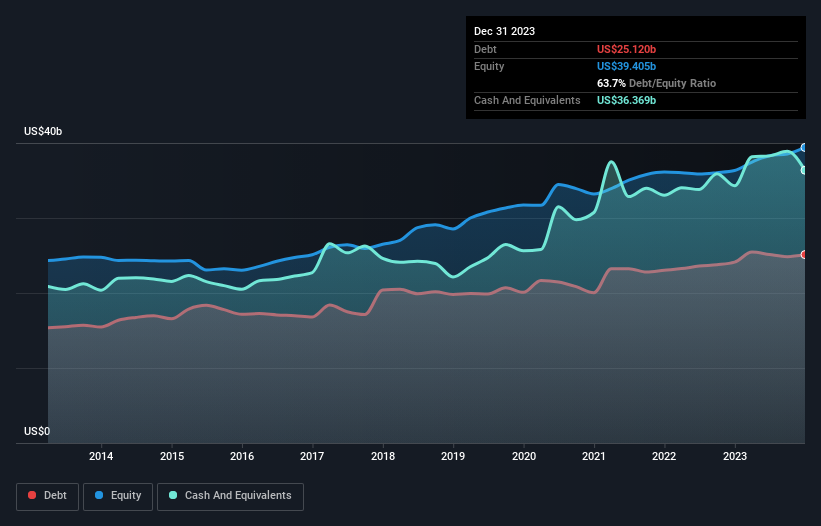Elevance Health (NYSE:ELV) Could Easily Take On More Debt
Warren Buffett famously said, 'Volatility is far from synonymous with risk.' So it seems the smart money knows that debt - which is usually involved in bankruptcies - is a very important factor, when you assess how risky a company is. Importantly, Elevance Health, Inc. (NYSE:ELV) does carry debt. But the real question is whether this debt is making the company risky.
When Is Debt A Problem?
Debt is a tool to help businesses grow, but if a business is incapable of paying off its lenders, then it exists at their mercy. If things get really bad, the lenders can take control of the business. While that is not too common, we often do see indebted companies permanently diluting shareholders because lenders force them to raise capital at a distressed price. Of course, plenty of companies use debt to fund growth, without any negative consequences. The first step when considering a company's debt levels is to consider its cash and debt together.
View our latest analysis for Elevance Health
How Much Debt Does Elevance Health Carry?
You can click the graphic below for the historical numbers, but it shows that as of December 2023 Elevance Health had US$25.1b of debt, an increase on US$24.1b, over one year. However, it does have US$36.4b in cash offsetting this, leading to net cash of US$11.2b.
A Look At Elevance Health's Liabilities
Zooming in on the latest balance sheet data, we can see that Elevance Health had liabilities of US$41.8b due within 12 months and liabilities of US$27.7b due beyond that. Offsetting this, it had US$36.4b in cash and US$18.1b in receivables that were due within 12 months. So its liabilities total US$15.0b more than the combination of its cash and short-term receivables.
Of course, Elevance Health has a titanic market capitalization of US$119.4b, so these liabilities are probably manageable. But there are sufficient liabilities that we would certainly recommend shareholders continue to monitor the balance sheet, going forward. While it does have liabilities worth noting, Elevance Health also has more cash than debt, so we're pretty confident it can manage its debt safely.
And we also note warmly that Elevance Health grew its EBIT by 16% last year, making its debt load easier to handle. When analysing debt levels, the balance sheet is the obvious place to start. But ultimately the future profitability of the business will decide if Elevance Health can strengthen its balance sheet over time. So if you want to see what the professionals think, you might find this free report on analyst profit forecasts to be interesting.
But our final consideration is also important, because a company cannot pay debt with paper profits; it needs cold hard cash. While Elevance Health has net cash on its balance sheet, it's still worth taking a look at its ability to convert earnings before interest and tax (EBIT) to free cash flow, to help us understand how quickly it is building (or eroding) that cash balance. During the last three years, Elevance Health produced sturdy free cash flow equating to 78% of its EBIT, about what we'd expect. This cold hard cash means it can reduce its debt when it wants to.
Summing Up
Although Elevance Health's balance sheet isn't particularly strong, due to the total liabilities, it is clearly positive to see that it has net cash of US$11.2b. And it impressed us with free cash flow of US$6.8b, being 78% of its EBIT. So is Elevance Health's debt a risk? It doesn't seem so to us. When analysing debt levels, the balance sheet is the obvious place to start. But ultimately, every company can contain risks that exist outside of the balance sheet. For instance, we've identified 1 warning sign for Elevance Health that you should be aware of.
If, after all that, you're more interested in a fast growing company with a rock-solid balance sheet, then check out our list of net cash growth stocks without delay.
Have feedback on this article? Concerned about the content? Get in touch with us directly. Alternatively, email editorial-team (at) simplywallst.com.
This article by Simply Wall St is general in nature. We provide commentary based on historical data and analyst forecasts only using an unbiased methodology and our articles are not intended to be financial advice. It does not constitute a recommendation to buy or sell any stock, and does not take account of your objectives, or your financial situation. We aim to bring you long-term focused analysis driven by fundamental data. Note that our analysis may not factor in the latest price-sensitive company announcements or qualitative material. Simply Wall St has no position in any stocks mentioned.

